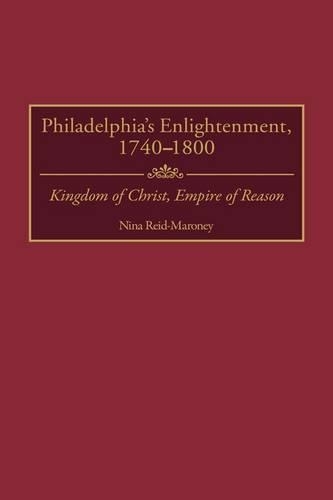
Philadelphia's Enlightenment, 1740-1800: Kingdom of Christ, Empire of Reason
(Hardback)
Publishing Details
Philadelphia's Enlightenment, 1740-1800: Kingdom of Christ, Empire of Reason
By (Author) Nina Reid-Maroney
Bloomsbury Publishing PLC
Praeger Publishers Inc
30th November 2000
United States
Classifications
Tertiary Education
Non Fiction
Christianity
Social and cultural history
History of science
277.4811
Physical Properties
Hardback
216
Description
Rather than treating the Great Awakening and the Enlightenment as defining opposites in 18th century American culture, this study argues that the imperatives of the great revival actually shaped the pursuit of enlightened science. Reid-Maroney traces the interwoven histories of the two movements by reconstructing the intellectual world of the Philadelphia circle. Prophets of the Enlightenment had long tried to resolve pressing questions about the limitations of human reason and the sources of our knowledge about the created order of things. The leaders of the Awakening addressed those questions with a new urgency and, in the process, determined the character of the Enlightenment emerging in Philadelphia's celebrated culture of science. Tracing the influence of evangelical sensibility and the development of a Calvinist parallel to the philosophical skepticism of enlightened Scots, Reid-Maroney finds that the Philadelphians' love of science rested on a radical critique of human reason, even while it acknowledged that reason was the dignifying and distinguishing property of human nature. Benjamin Rush alluded to an enlightenment wrought by grace in his image of the Kingdom of Christ and the Empire of Reason. In the post-Revolutionary period, the redemptive Enlightenment of the Philadelphia circle reached its greatest cultural power as a vision for scientific progress in the new republic.
Reviews
[A] provocative and pioneering work.-Journal of Presbyterian History
[C]learly deserves a place in the front rank of those who have tested May's thesis and found it full of rewards. What Fiering did for Harvard, and Noll and Loetscher for Princeton, Reid-Mahoney has now done for Philadelphia, and with greater stylistic charm and ingenuity.-The Pennsylvania Magazine of History and Biography
[R]eid-Maroney's monograph is an important book; more significantly, this study gives us, at long last, a necessary corrective to previous interpretations that have made the American Enlightenment either a pragmatic episode in which Americans "practiced" what Europeans only theorized or an intellectual movement dominated by "reason" and deism.-Isis
Reid-Maroney offers an elegant and reasoned inteleectual history of a group that viewed the intellect with skepticism, and this offers a fine example of finding synthesis where we did not expect it to be.-Technology and Culture
This is a graceful and persuasive study. Those interested in the dissemination of the Scottish Enlightenment, in the history of medicine, in early Philadelphia, and in the history of religious thought will find much to please them.-Eighteenth-Century Scotland
[A] provocative and pioneering work.Journal of Presbyterian History
"A provocative and pioneering work."-Journal of Presbyterian History
"Clearly deserves a place in the front rank of those who have tested May's thesis and found it full of rewards. What Fiering did for Harvard, and Noll and Loetscher for Princeton, Reid-Mahoney has now done for Philadelphia, and with greater stylistic charm and ingenuity."-The Pennsylvania Magazine of History and Biography
"Reid-Maroney's monograph is an important book; more significantly, this study gives us, at long last, a necessary corrective to previous interpretations that have made the American Enlightenment either a pragmatic episode in which Americans "practiced" what Europeans only theorized or an intellectual movement dominated by "reason" and deism."-Isis
"[A] provocative and pioneering work."-Journal of Presbyterian History
"[C]learly deserves a place in the front rank of those who have tested May's thesis and found it full of rewards. What Fiering did for Harvard, and Noll and Loetscher for Princeton, Reid-Mahoney has now done for Philadelphia, and with greater stylistic charm and ingenuity."-The Pennsylvania Magazine of History and Biography
"Reid-Maroney offers an elegant and reasoned inteleectual history of a group that viewed the intellect with skepticism, and this offers a fine example of finding synthesis where we did not expect it to be."-Technology and Culture
"This is a graceful and persuasive study. Those interested in the dissemination of the Scottish Enlightenment, in the history of medicine, in early Philadelphia, and in the history of religious thought will find much to please them."-Eighteenth-Century Scotland
"[R]eid-Maroney's monograph is an important book; more significantly, this study gives us, at long last, a necessary corrective to previous interpretations that have made the American Enlightenment either a pragmatic episode in which Americans "practiced" what Europeans only theorized or an intellectual movement dominated by "reason" and deism."-Isis
Author Bio
NINA REID-MARONEY teaches History and Women's Studies at the University of Windsor./e
